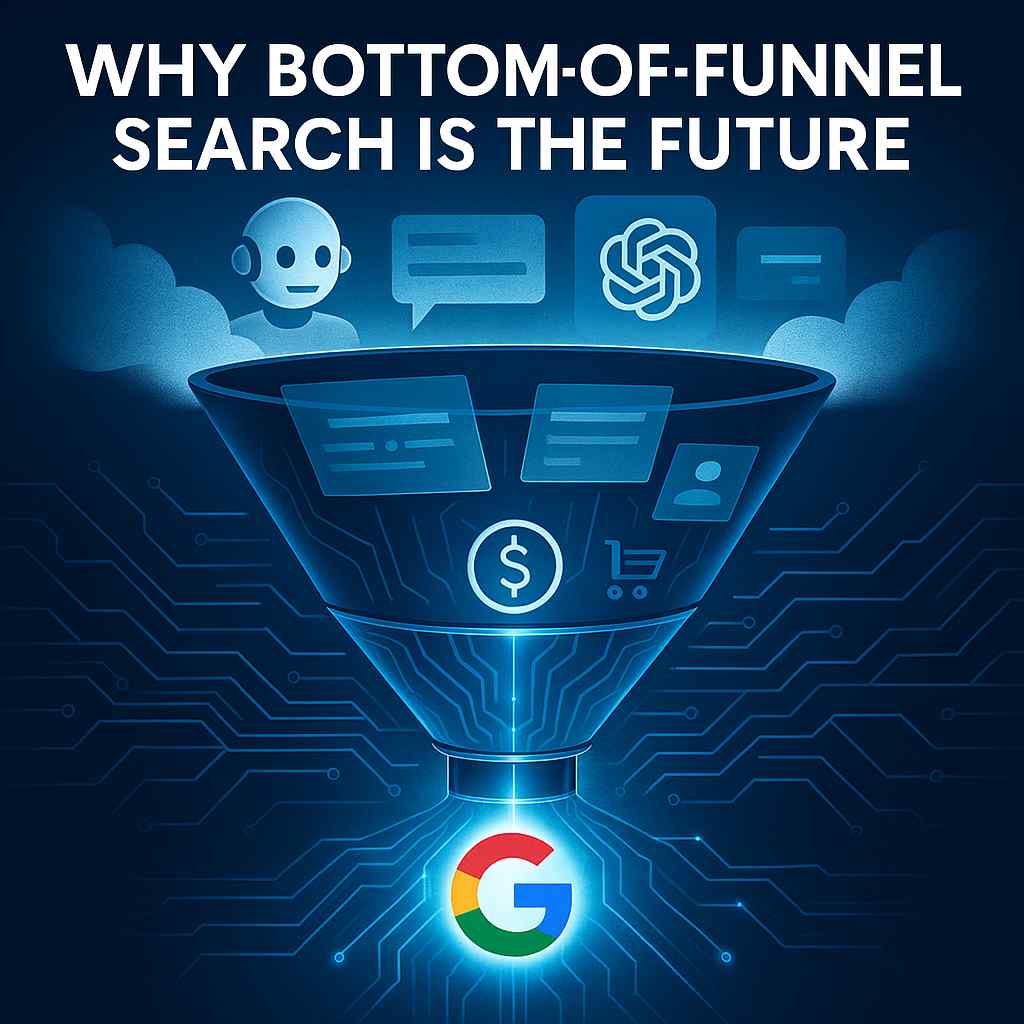The Evolution of SEO: Why Bottom-of-Funnel Search is the Future

For over a decade, SEO has revolved around two mantras: ‘Build great content’ and ‘optimise for the user’.
Post-Panda, thin and duplicate content became liabilities. Post-Penguin, content turned into a vehicle for attracting links – under the pretence it was all for the user’s benefit. Then came EEAT, further reinforcing the idea that more content was the answer.
In practice, this often meant something simpler: churning out informational blog posts that were only loosely connected to the core product – because they offered abundant keywords to optimise for and enough search volume to justify the effort.
That era is ending.
AI-powered search and LLMs have fundamentally rewritten the rules – but not in the way most people think.
The Great Cannibalisation
Top- and mid-funnel search is being squeezed from all directions.
Generative AI results have removed 95% of the user’s incentive to click through for simple questions. Google’s AI Overviews now summarise everything from “how to change a tyre” to “what is CRM?” – right in the SERP.
LLMs like ChatGPT and Gemini are absorbing curiosity-driven queries entirely. Instead of searching and sifting through links, people just ask the model and get a synthetic answer.
TikTok search has become the default for an entire generation who never even see a traditional SERP.
This is not a gradual decline in clickthrough. It’s a collapse.
Why Bottom-of-Funnel Is All That’s Left
While many in the industry are panicking about AI replacing search altogether, they’re missing a first-principles truth:
LLMs are simply not good products for transactional queries.
If you’re researching a product or service, you don’t want a single paragraph of text. You want a shortlist. You want comparisons, prices, contact details, credibility signals.
When LLMs attempt to deliver this, they often:
- Pull lists from Bing or (increasingly) Google, in inconsistent and opaque ways.
- Generate outputs that are hyper-personalised by account, chat history, and prompt phrasing.
- Produce results that feel clunky, unpredictable, and unrepeatable.
From a user’s perspective, this makes LLM search unreliable for commercial decisions.
From a marketer’s perspective, it means there is no stable acquisition channel to optimise against.
That matters – because the one place Google still reliably monetises is bottom-funnel, high-intent search. Those are the queries driving paid search revenue. Google has no incentive to fully replace them with AI summaries or the upcoming AI Mode.
Authority Is a Zero-Sum Game
This is where most brands go wrong.
The fear of AI and generative results has led many to jump to a false conclusion: that optimising for AI Mode is the solution.
In response, they double down on publishing even more informational content. They assume that flooding the web with upper-funnel material will increase the odds of being cited in AI and preserve organic market share.
This might seem like a logical solution, but it does not hold up under first-principles scrutiny.
In a world where clickthrough has evaporated, that content is no longer an asset.
It is a liability.
Make no mistake: informational content still plays a role, but it’s function has been relegated to that of a mere EEAT checkbox.
You still need it to show expertise. To send trust signals. To maintain your relevance in Google’s eyes.
You do not need it to rank – or to absorb your site’s authority.
Think of authority like capital in an investment portfolio:
- Every internal link, every indexed page, every navigation element is a capital allocation decision.
- Every time you feed low-intent content, you’re diluting the ROI of the pages that matter.
- This is how brands end up with large sites that look impressive and perform terribly.
The Only Defensible Moat
As AI continues to commoditise content creation, most SEO strategies will converge into a race to the bottom – more pages, more words, more cost, less impact.
The alternative is not to “stop publishing.”
It’s to re-prioritise.
To route authority towards transactional, bottom-funnel pages:
- Service pages
- Product listings
- Pricing and comparison pages
- Location and “near me” queries
These are the last defensible spaces in search – because they still require clicks and conversions.
They are also the pages where your return on authority compounds.
The MX Engine Advantage
In this environment, structured authority allocation isn’t a luxury. It’s survival.
This is where the MX Engine comes in.
The MX Engine is a system that:
- Routes authority to your highest-yield assets
- Prevents it leaking into low-value content
- Creates a predictable, compounding return over time
It’s Sovereign SEO in action: a strategy of control, not guesswork.
While everyone else chases AI inclusion, you build a system that puts your most important pages ahead of the competition.
Final Takeaway
AI Mode will not replace SEO, but it does mark the end of the idea that simply publishing more content and optimising for the user is enough.
Top-funnel search is disappearing. Informational content has become a box-ticking exercise.
However, bottom-funnel intent still drives clicks, conversions, and revenue.
- You cannot out-volume AI.
- You cannot out-guess it.
- You can out-structure it.
The future belongs to those who treat authority as capital and allocate it with purpose.
This is what Sovereign SEO was built for.
Get in touch to see how a Sovereign SEO strategy can put your most important pages ahead of the competition.

Mike Simpson
With nearly 15 years of experience in SEO and digital marketing, Mike has built a reputation for driving growth and innovation. His journey began at Havas Media, where he developed expertise in client management, technical auditing, and strategic planning for top brands like Tesco Bank and Domino’s Pizza. He progressed to leading teams at Forward Internet Group and IPG Media-Brands, before taking on the role of Commercial Director & Chief Product Strategist at Barracuda Digital, where he delivered significant results for high-profile clients.
Now working as a consultant, Mike leverages his extensive experience to help businesses enhance their digital strategies, delivering bespoke solutions and measurable success. His strategic insights and dedication have made him a sought-after expert in the industry.